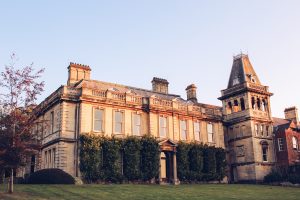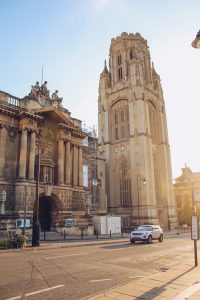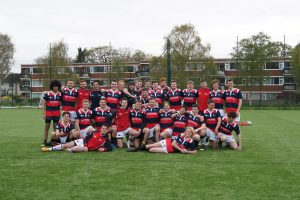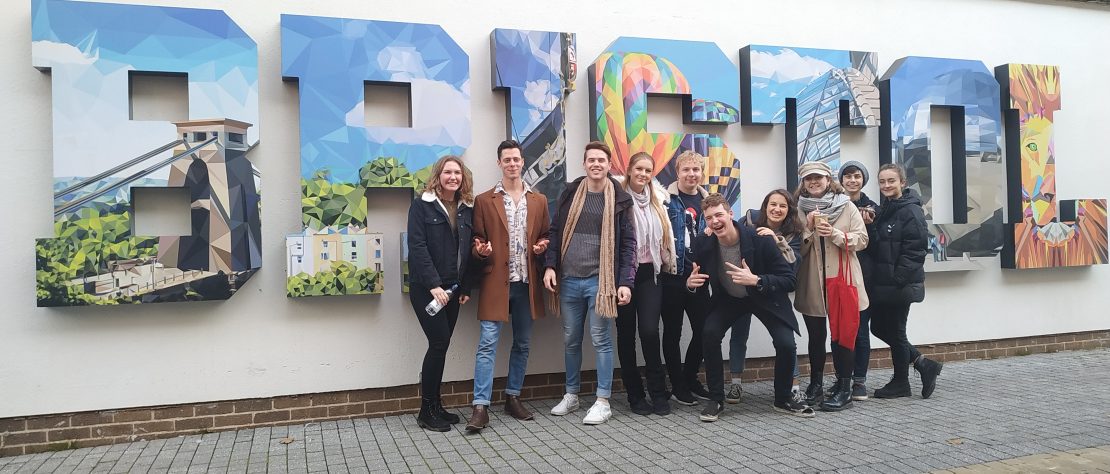Before departure – South Africa
Planning for a semester exchange abroad is vital and almost just as daunting as actually departing. One Thursday morning in September of 2019 I was packed (excited and anxious), and ready to depart to Bristol, England for my four-month exchange at the prestigious University of Bristol. However, my pre-departure preparations started many months earlier. In order to enter the United Kingdom with a South African passport I required a visa – either a Tier 4, or Short-Term student visa valid for 180 days. I applied for the latter as it was more affordable and is generally processed and approved quicker. You can only apply within three months of departing, which is not an issue considering UK visas generally get approved two weeks after applying. The entire operation is rather straightforward as I only needed to make an embassy appointment and provide all the needed paperwork – such as proof of course acceptance letters, flight information and host university accommodation documents, all of which gets provided to you (be sure to print these out before you visit the embassy).
Before arriving in Bristol exchange students need to choose their accommodation in advance out of a list of nearly 30 different university halls – these halls are located in three difference villages; North (Stoke Bishop), West (Clifton Village) and East (City Centre). Choose wisely as each accommodation has its pros and cons. For instance, the North village accommodation is roughly a 40-minute walk from the university, although the university does provide all students with a year-long bus pass. Furthermore, accommodation cost is calculated per week (ranging from £100 to £300+) and is split up between villages as well as catered and non-catered. I chose the picturesque grounds of Goldney Hall in the West village as it was nearest to both Bristol City Centre and the university campus, at a reasonable price. The accommodation costs are covered by a housing bursary receivable from the host university (the difference in accommodation cost and bursary is entirely receivable/payable by you); and all accommodation information is also on the University of Bristol webpage. Prior to my arrival I needed to apply for housing on Bristol university’s accommodation portal which also shows your application status and other important information.
I also needed to select the modules and classes I would like to take before arriving, however, I got to amend this in the first week of classes. Registering from classes is fairly easy when using the host university’s online portals (MyBristol.co.uk) and as an exchange student, the university’s exchange officials are in constant contact via email to answer any questions you might have. Word of advice, register for more units than what your credit requirements are – this will give you options for choosing your favorite modules later on. Stick to registering for first (C/4) and second (I/5) year modules as the work is generally more advance than Stellenbosch (I took a second-year economics module that covered work done at master’s level at Stellenbosch). All unit information will be available in the Programme Catalogue on Bristol.ac.uk.
When it comes to booking flights be sure to buy your ticket well in advance to ensure the best deals. I opted to book my ticket from Cape Town to London and then took a train to Bristol (about a two-hour journey) since public transport is very reliable – I also suggest keeping luggage at a minimum (I had two 20-kilogram suitcases).

University of Bristol – England
The day I arrived I was unaware of the immensely busy week that laid ahead. All international students move into accommodation a day before English students arrive (usually the 19th or 20th of September), thereafter you will start to meet all your flat mates (unfortunately you will not be able to find out who you live with until you move in – however, don’t be anxious, I ended up making friends for life with everyone in my flat and we’re planning our England-South Africa visits).
First things first, in order to receive your bursary from the university you will need to open a UK bank account – you can only do this once you have fully registered and received a physical copy of your proof of registration. All registrations happen in the first two days so be sure to keep an eye out for emails stating when, where and in which building registrations take place (usually in the magnificently grand Wills Memorial Building) – this is also where you will receive your U-card (student ID). Once you have received your proof of registration you’ll need to book an appointment with a bank of your choice (the university provides a PDF document stating all the possible banks and their perks – I opted for HSBC since I could freely transfer money internationally). Opening a bank account is fairly easy and about two or three weeks after you have submitted your UK banking details to the university (on MyBristol) you will receive your scholarship.

After you have moved in you will need to sort out bedding, kitchen utensils and general living equipment – I suggest taking the local bus to Ikea for all your needs (invite your flat-mates and make it a fun outing). Now it’s time for Freshers! Freshers in the first week (o-week) where students mingle and meet course mates while attending university-, and society-planned activities. Take advantage of these as you will meet loads of new people and get free meals since most events offer food. Freshers is concluded with the Freshers Fair where every new student can go to sign up for societies, meet new people and receive freebies. I decided to sign up to numerous societies and I was definitely not disappointed. I ended up becoming part of the Clifton Crusaders Rugby Team and played numerous matches, I joined badminton and lacrosse teams, I joined the Bristol United Nations society, the Economics and Finance society, the Jive Dance society and of course the Wine & Gin society. I also ran in the JCR (Junior Common Room) elections (much like Stellenbosch HK) and stood as JCR International Representative for my hall of residence where we had a budget of £40,000 (nearly R1m) to organize residence events such as formals. I strongly suggest taking part as much as you can as this is going to make your exchange so much more enriched. Furthermore, do not feel pressured to buy the Freshers Wristband, although I would strongly recommend it, regardless of what your flat mates do, since you will save a lot of money and meet a lot of new people all while learning about Bristol and British live in general.
After Freshers you will have your first lectures. Much like Stellenbosch you will need to construct your own lecture timetable and cross-check any timetable restrictions and clashes – this can easily be rectified by seeing your course coordinator (usually at Priory Road Complex for business modules). Be sure to attend classes more religiously than in Stellenbosch, as the pace of work is much faster – lectures also tend to be two hours as opposed to 50 minutes in Stellenbosch so prepare accordingly. Lectures tend to be longer since contact-hours (lectures) per week is low; students are expected to do more individual revision than in Stellenbosch.
Furthermore, most modules only have one opportunity to gain marks (most exams count 100% of the unit) or a substantial assignment that requires work throughout the semester. The grading system in England is also very different from Stellenbosch University. Beware, do not expect to achieve the same mark at Bristol as you would at Stellenbosch – for instance, any work that receives a mark of 85-90% or above is likely to be published in newspapers (kind off). Generally anything above 60% is considered good, also known as a 2:1 (‘two-one’). Anything between 50 and 59 is a 2:2 (‘two-two’) and anything above 70% is a distinction (or ‘First’) – the pass rate is 40%. Lastly, don’t worry about buying textbooks as all prescribes textbooks are available at one of the university’s six libraries.
Some extra added advice: stay informed and be involved in as much as you can! After signing up to the university’s mailing list and going to a ‘Careers in Consultancy’ event, I ended up meeting a large London-based consultancy firm’s recruitment officer. Long story short, I got invited to attend an all-paid graduate case-study training weekend at the firm’s London offices, after which I went to their flagship event and secured an interview for their Operations Consultant vacancy. At the flagship event I also had the opportunity to speak to numerous experienced consultants, associates, MD’s and even the CEO.

The Return- South Africa

Before I knew it my British exchange was all finished (sadly I didn’t even end up meeting Her Majesty the Queen), and it was time for me to pack my bags and embark on the 20+ hour journey back home. Notably, although I knew about so-called ‘post-exchange depression’ I thought little of it coming home to sunny South Africa. However, although it was not very severe, it is definitely something I would suggest preparing for. To a certain extent I had to re-adjust to normal ‘pre-exchange’ routines; nonetheless, after classes started I quickly found my feet again. During the first few weeks back one of the greatest challenges (funnily enough) was adjusting to the scolding Stellenbosch heat; something I completely forgot about in my daily 3 degrees Celsius Bristol commute. Furthermore, however insignificant, I felt that the pace of work in lectures at Stellenbosch is abnormally slow, but I got used to this as well.
Ultimately, my experiences abroad definitely had a substantial impact on me and where I see myself in years to come. Being fully submerged in a foreign culture truly lays the foundations for a more open-minded perspective on the world, devoid of any and all bigotry and prejudices. This, amongst other things, is one of my greatest realizations, which could only be brought about by an academic exchange. I would definitely consider future career opportunities in England and I am in the process of applying for postgraduate studies in Bristol and London. Lastly, I also returned home with a revitalized appreciation for our beautiful country and all its problems. All countries (including England) have their own socio-economic challenges and, more often than not, the grass is not greener on the other side. Nevertheless, in this case England’s grass is a tad greener (possibly just from all the rain!). Altogether, my exchange ended up being the best few months of my entire degree and possibly my life. I would definitely recommend all students to embark on this adventurous and challenging journey as it broadens your scope of thought and expands your horizons in terms of academics and future prospects, all while meeting wonderful people. So, if anyone wants some pointers for exchanging to Bristol University, or England in general, (as per quintessential British etiquette) let’s have a pint and talk about it.

